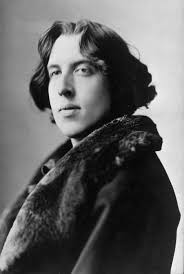The Picture of Dorian Gray Page #36
The Picture of Dorian Gray is a Gothic and philosophical novel by Oscar Wilde, first published complete in the July 1890 issue of Lippincott's Monthly Magazine. Fearing the story was indecent, prior to publication the magazine's editor deleted roughly five hundred words without Wilde's knowledge.
Cloudless, and pierced by one solitary star, a copper-green sky gleamed through the windows. He read on by its wan light till he could read no more. Then, after his valet had reminded him several times of the lateness of the hour, he got up, and going into the next room, placed the book on the little Florentine table that always stood at his bedside and began to dress for dinner. It was almost nine o'clock before he reached the club, where he found Lord Henry sitting alone, in the morning-room, looking very much bored. "I am so sorry, Harry," he cried, "but really it is entirely your fault. That book you sent me so fascinated me that I forgot how the time was going." "Yes, I thought you would like it," replied his host, rising from his chair. "I didn't say I liked it, Harry. I said it fascinated me. There is a great difference." "Ah, you have discovered that?" murmured Lord Henry. And they passed into the dining-room. CHAPTER 11 For years, Dorian Gray could not free himself from the influence of this book. Or perhaps it would be more accurate to say that he never sought to free himself from it. He procured from Paris no less than nine large-paper copies of the first edition, and had them bound in different colours, so that they might suit his various moods and the changing fancies of a nature over which he seemed, at times, to have almost entirely lost control. The hero, the wonderful young Parisian in whom the romantic and the scientific temperaments were so strangely blended, became to him a kind of prefiguring type of himself. And, indeed, the whole book seemed to him to contain the story of his own life, written before he had lived it. In one point he was more fortunate than the novel's fantastic hero. He never knew--never, indeed, had any cause to know--that somewhat grotesque dread of mirrors, and polished metal surfaces, and still water which came upon the young Parisian so early in his life, and was occasioned by the sudden decay of a beau that had once, apparently, been so remarkable. It was with an almost cruel joy--and perhaps in nearly every joy, as certainly in every pleasure, cruelty has its place--that he used to read the latter part of the book, with its really tragic, if somewhat overemphasized, account of the sorrow and despair of one who had himself lost what in others, and the world, he had most dearly valued. For the wonderful beauty that had so fascinated Basil Hallward, and many others besides him, seemed never to leave him. Even those who had heard the most evil things against him--and from time to time strange rumours about his mode of life crept through London and became the chatter of the clubs--could not believe anything to his dishonour when they saw him. He had always the look of one who had kept himself unspotted from the world. Men who talked grossly became silent when Dorian Gray entered the room. There was something in the purity of his face that rebuked them. His mere presence seemed to recall to them the memory of the innocence that they had tarnished. They wondered how one so charming and graceful as he was could have escaped the stain of an age that was at once sordid and sensual. Often, on returning home from one of those mysterious and prolonged absences that gave rise to such strange conjecture among those who were his friends, or thought that they were so, he himself would creep upstairs to the locked room, open the door with the key that never left him now, and stand, with a mirror, in front of the portrait that Basil Hallward had painted of him, looking now at the evil and aging face on the canvas, and now at the fair young face that laughed back at him from the polished glass. The very sharpness of the contrast used to quicken his sense of pleasure. He grew more and more enamoured of his own beauty, more and more interested in the corruption of his own soul. He would examine with minute care, and sometimes with a monstrous and terrible delight, the hideous lines that seared the wrinkling forehead or crawled around the heavy sensual mouth, wondering sometimes which were the more horrible, the signs of sin or the signs of age. He would place his white hands beside the coarse bloated hands of the picture, and smile. He mocked the misshapen body and the failing limbs. There were moments, indeed, at night, when, lying sleepless in his own delicately scented chamber, or in the sordid room of the little ill-famed tavern near the docks which, under an assumed name and in disguise, it was his habit to frequent, he would think of the ruin he had brought upon his soul with a pity that was all the more poignant because it was purely selfish. But moments such as these were rare. That curiosity about life which Lord Henry had first stirred in him, as they sat together in the garden of their friend, seemed to increase with gratification. The more he knew, the more he desired to know. He had mad hungers that grew more ravenous as he fed them. Yet he was not really reckless, at any rate in his relations to society. Once or twice every month during the winter, and on each Wednesday evening while the season lasted, he would throw open to the world his beautiful house and have the most celebrated musicians of the day to charm his guests with the wonders of their art. His little dinners, in the settling of which Lord Henry always assisted him, were noted as much for the careful selection and placing of those invited, as for the exquisite taste shown in the decoration of the table, with its subtle symphonic arrangements of exotic flowers, and embroidered cloths, and antique plate of gold and silver. Indeed, there were many, especially among the very young men, who saw, or fancied that they saw, in Dorian Gray the true realization of a type of which they had often dreamed in Eton or Oxford days, a type that was to combine something of the real culture of the scholar with all the grace and distinction and perfect manner of a citizen of the world. To them he seemed to be of the company of those whom Dante describes as having sought to "make themselves perfect by the worship of beauty." Like Gautier, he was one for whom "the visible world existed." And, certainly, to him life itself was the first, the greatest, of the arts, and for it all the other arts seemed to be but a preparation. Fashion, by which what is really fantastic becomes for a moment universal, and dandyism, which, in its own way, is an attempt to assert the absolute modernity of beauty, had, of course, their fascination for him. His mode of dressing, and the particular styles that from time to time he affected, had their marked influence on the young exquisites of the Mayfair balls and Pall Mall club windows, who copied him in everything that he did, and tried to reproduce the accidental charm of his graceful, though to him only half-serious, fopperies.
Translation
Translate and read this book in other languages:
Select another language:
- - Select -
- 简体中文 (Chinese - Simplified)
- 繁體中文 (Chinese - Traditional)
- Español (Spanish)
- Esperanto (Esperanto)
- 日本語 (Japanese)
- Português (Portuguese)
- Deutsch (German)
- العربية (Arabic)
- Français (French)
- Русский (Russian)
- ಕನ್ನಡ (Kannada)
- 한국어 (Korean)
- עברית (Hebrew)
- Gaeilge (Irish)
- Українська (Ukrainian)
- اردو (Urdu)
- Magyar (Hungarian)
- मानक हिन्दी (Hindi)
- Indonesia (Indonesian)
- Italiano (Italian)
- தமிழ் (Tamil)
- Türkçe (Turkish)
- తెలుగు (Telugu)
- ภาษาไทย (Thai)
- Tiếng Việt (Vietnamese)
- Čeština (Czech)
- Polski (Polish)
- Bahasa Indonesia (Indonesian)
- Românește (Romanian)
- Nederlands (Dutch)
- Ελληνικά (Greek)
- Latinum (Latin)
- Svenska (Swedish)
- Dansk (Danish)
- Suomi (Finnish)
- فارسی (Persian)
- ייִדיש (Yiddish)
- հայերեն (Armenian)
- Norsk (Norwegian)
- English (English)
Citation
Use the citation below to add this book to your bibliography:
Style:MLAChicagoAPA
"The Picture of Dorian Gray Books." Literature.com. STANDS4 LLC, 2024. Web. 27 Nov. 2024. <https://www.literature.com/book/the_picture_of_dorian_gray_869>.




Discuss this The Picture of Dorian Gray book with the community:
Report Comment
We're doing our best to make sure our content is useful, accurate and safe.
If by any chance you spot an inappropriate comment while navigating through our website please use this form to let us know, and we'll take care of it shortly.
Attachment
You need to be logged in to favorite.
Log In